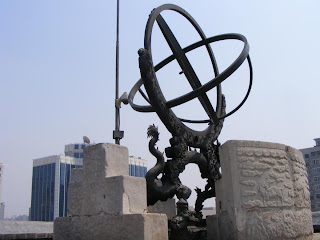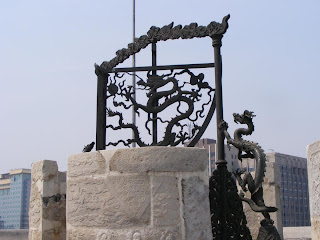Am ales sa vad Observatorul Antic nu pentru ca m-as pricepe la astronomie ci pentru ca imi inchipuiam ca exponatele de acolo pot fi privite ca niste lucrari de arta. Urmeaza sa judecati singuri daca am avut dreptate sau nu.
Observatorul a fost construit in 1442, in timpul dinastiei Ming, cand a purtat numele de “Platforma de urmarit stele”. In timpul dinastiei Qing, acest nume a fost schimbat in “Observator”. Acesta poate fi considerat unul dintre cele mai vechi observatoare astronomice din lume, cu o istorie neintrerupta a observarii fenomenelor ceresti, de peste 500 de ani (pana in 1929). Fiind inchis o lunga perioada de timp, a fost deschis pentru public in 1956.
Observatorul este deschis intre 9-18 in toate zilele, exceptand cele de luni si marti. Intrarea costa doar 6RMB, adica cca. 70 eurocenti. Statia de metrou: Jianguomen.
Turnul face parte din vechiul zid care inconjura Beijingul si se afla in sud-vestul cartierului Dongcheng. El are o inaltime cuprinsa intre 14-18 m, in functie de autorul informatiei. Pe terasa sa se afla expuse 8 instrumente din bronz, datand din perioada dinastiei Qing. Majoritatea exponatelor au fost construite de catre iezuitul Ferdinand Verbiest. De aceea, observatorul poate fi privit ca un important punct de schimb cultural intre est si vest. Admirati instrumentele expuse,cum am facut si noi, ca pe niste opere de arta (faceti click pe poza, ca sa vedeti detaliile). Dragonii zburatori sau florile gravate, atat de tipice pentru cultura chineza, le dau si acest caracter.
O mica gradina, cu pomi, iarba si flori, da prilejul expunerii altor instrumente precum si a busturilor unor astronomi ai vremii. Acestia sunt Shen Kuo (1031-1095), a carui contributie importanta la domeniu consta in alcatuirea calendarului numit “Calendar solar cu 12 termeni”, utilizat in agricultura si Guo Shoujing (1231-1316), care a calculat calendarul de 365.24 zile, utilizat cel mai mult in istoria chineza. In acelasi timp, gradina constituie o oaza de liniste, cu cantec de pasarele, unde te poti refugia de zgomotul orasului.
Trecem apoi printr-o poarta de hobbiti (vezi Stapanul inelelor, cu portile rotunde preferate de acestia – autorul s-a inspirat, posibil, din cultura chineza pentru acest element), in alta mica curte interioara, care duce spre cateva sali de expozitie. In curte, admiram din nou cateva instrumente, precum copia unui armilariu din epoca Ming (1439), al carui original se afla la Najing.
Obviously, I am not a specialist in astronomy, but I choosed to see the Antic Observatory because I believed that what I may see there, could be judged as art objects also. See yourself and say if I was right or not. This is a small museum and, unfortunately (or should I say fortunately?), the tourists are not queing there. But never mind, we have the museum for ourselves. Beside the tower with the platform, where there are exposed 8 bronze instruments from Qing dynasty time, we have been in a little garden and a small courtyard, where we saw also astronomical instruments and found out about 2 of the most important Chinese astronomers. The observatory, one of the oldest in the world, enabled astronomical observations uninterrupted, for 500 years, till 1929. It was opened for the public in 1956.
I loved those flying dragons which adorned the instruments.
You may go there by metro, Jianguomen station. Entrance costs 68 eurocents! The museum is closed on Mondays and Tuesdays.





























Wow, wish I can be in Beijing for visit as every time just business trips !
And a wonderful thing to have strawberries behind your backyard ! That’s just very cool.
Thanks, Wong! I wish you could visit Beijing as a photographer from a very selfish reason: we will have such great pictures to look at!
There are also a lot of flowers in my garden too. When I will have more time, I will start a photo+gardener blog.
Extraordinar serial!
Sa ai un weekend frumos!
Salutari!
Multumesc, Wind1 Va fi unul aglomerat in orice caz!
Hello, Thanks for your visit.
I teach the subjects which falls under the category of Supply Chain Management and Life-Cycle Data Management.
Another great place to visit in this amazing city!
Have a lovely weekend:)
Hei, Wong, this seems interesting. I’m sure this has something to do with quality, logistics and marketing too. I used to work in an Agricultural Management Faculty but not anymore. Now I am in a specialised department in the frame of Technical University.
A nice weekend to you too, Joo! Thank you.
ººº
Beautiful pictures…
Cumpliments,
Jota
Thank you Jotta Ene! Greetings!
Your photos are just great by all means. I am glad every time I see pictures with taste and high quality of art. Kind regards.
Thank you for appreciation, Phivos! Yours aren’t bad either 🙂 Have a nice Sunday!
Looks great, what can I say. China is a very complex country and so big, it’s hard to digest on one trip. I surely would need to travel few months to really understand it.
You sure need more months for every region you want to discover, MKL! Mine was just a glimpse on Beijing.
I like everything here, but the images of the sculptures are something special to me!
You mean the dragons, VP? They are beautiful!
I am so happy to meet you! Your photos are incredible and yes! they ARE art. You were right! One of these days I would love to visit your country. My grandparents came originally from Bessarabia which is close to Czechoslovakia. I would love to visit that entire area someday. Thanks for stopping by. I hope that you come back again so that I may get to know you better. I will be back here for sure.
Thank you Teri, for your nice words! Please come back whenever you want. I will visit your site too. World is not so big after all 🙂
Very good 🙂
Thanks, Angel!
These photographs are all beautiful. Thanks for capturing these jawdropping monuments and statues for us to see.
It was my great pleasure, Rizalenio!